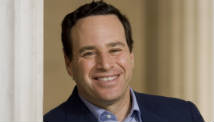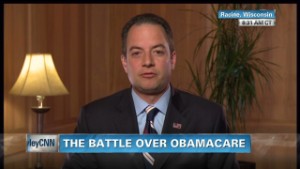Editor's note: David Frum, a CNN contributor, is a contributing editor at The Daily Beast. He is the author of eight books, including a new novel, "Patriots," and a postelection e-book, "Why Romney Lost." Frum was a special assistant to President George W. Bush from 2001 to 2002.
(CNN) -- Good news: We're not going to war in Syria, at least not right away.
Bad news: We're headed to a battle inside Congress that will pose its own grave threat to the U.S. and world economy.
The most conservative Republicans in Congress are threatening to force default on the nation's obligations unless the president agrees to defund Obamacare. Less conservative Republicans prefer a milder version of the threat: not default, but merely shutting down the government.
 David Frum
David Frum Either way, the country plunges into crisis -- a crisis Republicans must eventually lose, as they have lost every previous round of this same game.
It's way past time for Republicans to find a better way. These doomed all-or-nothing battles over Obamacare perversely strengthen President Obama. As Republicans exhaust themselves in grand debates, Obamacare fastens itself ever more tightly upon the country and the states. Obamacare offers large benefits to many Americans, and benefits once extended are very difficult to remove. That should have been the lesson of 2012, and unless Republicans get wiser, it'll be the repeat lesson of 2016.
Meanwhile, the clock is ticking. A core feature of Obama's health plan will go into effect in bare weeks -- and all the law's flaws continue unaddressed. The Republican challenge is to protect the country from those flaws, by concentrating on the reforms that matter most:
1) Control Obamacare's costs;
2) Share Obamacare's burdens more widely.
 RNC: We'll run on Obamacare in 2014
RNC: We'll run on Obamacare in 2014  Bill Clinton sells Obamacare to public
Bill Clinton sells Obamacare to public Take No. 1 first. America used to have two health care cost problems: the cost of the health care system to the total economy, and the cost of health care programs to government budgets. Those two costs were related, but distinct. One example: Before Obamacare, a proposal to raise the Medicare qualification age to 67 would have saved the government money, without changing any real economic costs.
As Obamacare goes into effect, those two costs merge into one. Raise the Medicare age to 67, and Medicare's costs may fall -- but other program costs will rise. An increase in health care costs anywhere will flow directly into an increase in government health care spending. If Republicans want to control the cost of government, they have to change their thinking from "cut government budgets" to "reform health care delivery."
To date, U.S. health care markets have done a poor job of controlling health care costs. That hasn't been a failure Republicans worried much about -- but they had better start, because if markets continue to fail, the alternatives will be ever more voracious health care costs or direct government control.
Now problem No. 2: burden-sharing.
Obamacare purports to finance itself with taxes only on upper-income Americans. The revenues from these taxes will be inadequate just as a matter of arithmetic. Worse, this mode of finance corrodes all political incentive for cost control. Not many voters will deprive themselves of a benefit to save somebody else money.
If Obamacare is to be part of America's future -- which is how the betting must run today -- this program that claims to benefit all should be paid for by all, as Social Security and Medicare are paid for by all.
Back in 2010, Democrats desperate for Republican support would happily have accepted a broader tax mechanism. Today, of course, they have less incentive to deal. Their voters do well out of Obamacare; the costs are borne by those Americans most likely to vote Republican.
But there are revenue measures Democrats would value even more highly than they value taxes on the affluent: carbon taxes, for example. A Republican plan to tax work and investment less and to tax carbon more -- and to use such taxes to support health care costs -- would appeal to Democrats, and would unite both Democrats and Republicans in a shared commitment to health care cost control.
These are real-world political tradeoffs. They are less exciting than the grand drama of repeal-or-bust. But repeal-or-bust is much more likely to produce a bust than a repeal. More productive is the challenge of reforming Obamacare so that the nation can live with its costs -- and so that all equitably shoulder their share of its burdens.
Follow @CNNOpinion on Twitter.
Join us at Facebook/CNNOpinion.
{ 0 comments... read them below or add one }
Post a Comment